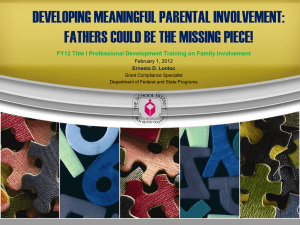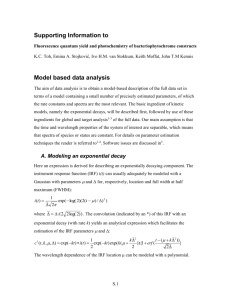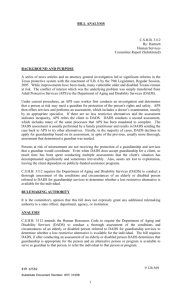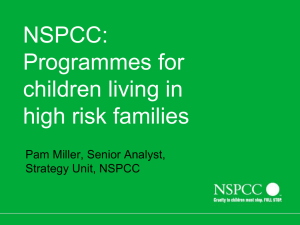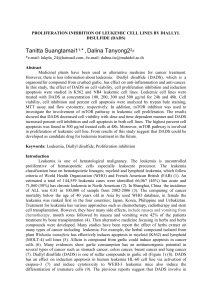Policy for Involving Parents to Raise Achievement
advertisement
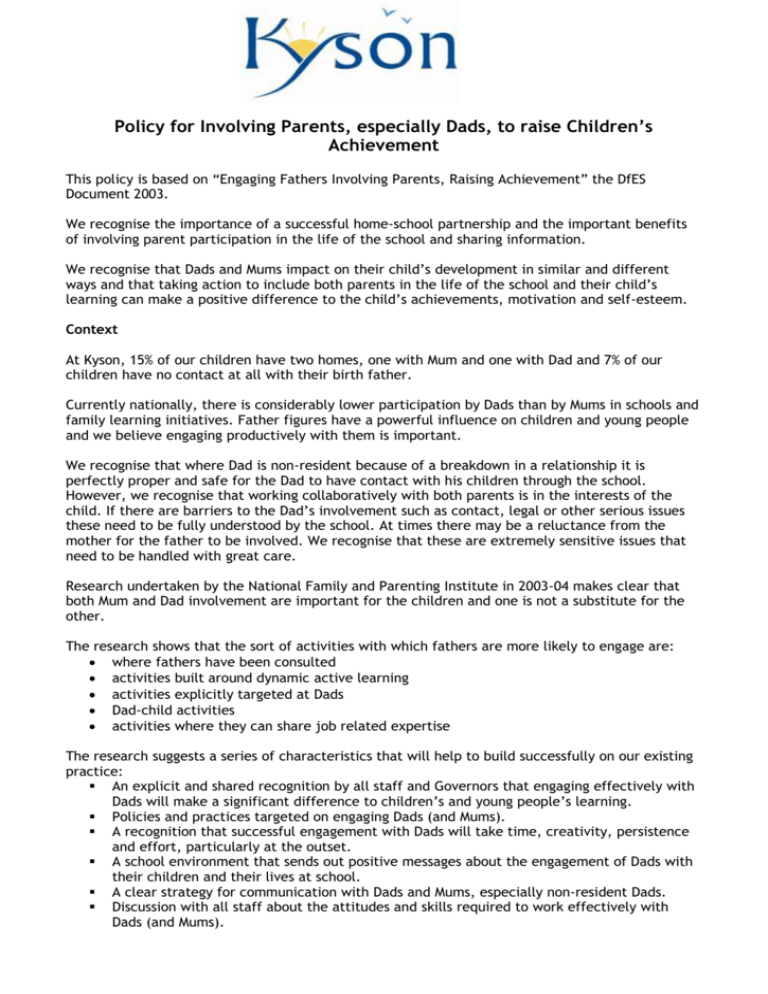
Policy for Involving Parents, especially Dads, to raise Children’s Achievement This policy is based on “Engaging Fathers Involving Parents, Raising Achievement” the DfES Document 2003. We recognise the importance of a successful home-school partnership and the important benefits of involving parent participation in the life of the school and sharing information. We recognise that Dads and Mums impact on their child’s development in similar and different ways and that taking action to include both parents in the life of the school and their child’s learning can make a positive difference to the child’s achievements, motivation and self-esteem. Context At Kyson, 15% of our children have two homes, one with Mum and one with Dad and 7% of our children have no contact at all with their birth father. Currently nationally, there is considerably lower participation by Dads than by Mums in schools and family learning initiatives. Father figures have a powerful influence on children and young people and we believe engaging productively with them is important. We recognise that where Dad is non-resident because of a breakdown in a relationship it is perfectly proper and safe for the Dad to have contact with his children through the school. However, we recognise that working collaboratively with both parents is in the interests of the child. If there are barriers to the Dad’s involvement such as contact, legal or other serious issues these need to be fully understood by the school. At times there may be a reluctance from the mother for the father to be involved. We recognise that these are extremely sensitive issues that need to be handled with great care. Research undertaken by the National Family and Parenting Institute in 2003-04 makes clear that both Mum and Dad involvement are important for the children and one is not a substitute for the other. The research shows that the sort of activities with which fathers are more likely to engage are: where fathers have been consulted activities built around dynamic active learning activities explicitly targeted at Dads Dad-child activities activities where they can share job related expertise The research suggests a series of characteristics that will help to build successfully on our existing practice: An explicit and shared recognition by all staff and Governors that engaging effectively with Dads will make a significant difference to children’s and young people’s learning. Policies and practices targeted on engaging Dads (and Mums). A recognition that successful engagement with Dads will take time, creativity, persistence and effort, particularly at the outset. A school environment that sends out positive messages about the engagement of Dads with their children and their lives at school. A clear strategy for communication with Dads and Mums, especially non-resident Dads. Discussion with all staff about the attitudes and skills required to work effectively with Dads (and Mums). Networking with other schools to share good practice. Programmes with sufficient flexibility in timing to meet the varying needs of Dads. An Audit of Current Practice We maintain a “Separate Parents Contact List” which we use to ensure separate parents are emailed or posted newsletters, class letters, reports, learning posters and targets. Throughout each school year there are numerous activities with which both Mums and Dads are comfortable to engage: Parent/teacher consultation evenings each term (we encourage separated parents to come together) Class assemblies twice a year Productions once each year for each year group Sports Day once a year Various PTFA Fundraisers (designed to appeal to a broad socio-economic range) Year 2 DT activity days Homework – spellings, reading, timestables and discussion/talk School activities which generally engage more with Mums than Dads: “Working School” visits each term Regular volunteer class helpers Governors annual “CCC” Volunteer helpers for day trips Where do we want to be? We want to improve the participation of our Dads in school life and their child’s learning. Starting points that we hope will become regular features across the school calendar to engage especially with Dads are: A Spring term Dad’s and children football afternoon A Summer term Dad’s and son’s cricket afternoon A sharing books afternoon each term, where Dads read to and listen to their own child/ren A Fathers Day celebration and “Message/Card to my Dad” It is hoped that our new Mathletics/games software for use at home by Year 3-6 children will appeal to Dad’s too. How shall we know if we are successful? We will see lots more Dads in our school and taking up our invitations to join us for particular activities. Also, in our next confidential Parent Questionnaire Spring 2011 we shall ask for specific feedback. Our Governor CCC response sheets will invite parents to comment and suggest further ideas and our parent Governors will seek the on-going views of Dads. Conclusion We are committed to a fully inclusive school environment and community and wish to actively seek the involvement of Dads in their child’s learning. We want all parents and especially Dads to feel a valuable part of their child’s learning process and to feel confident and welcome to take up regular opportunities provided by the school to spend time learning alongside their child. November 2009



